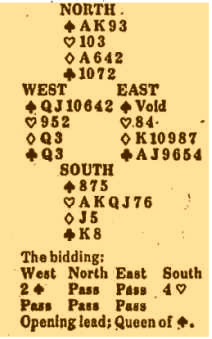 Nov. 25, 1976
Nov. 25, 1976
BY ‘SELECTING the best of the columns that he wrote for a leading London daily, Victor Mollo has attempted to paint a picture of the development of bridge in recent decades («Bridge Saga» by Victor Mollo Hart Publishing). Although he does not quite succeed and the effort is marred by several instances of careless editing, there are sufficient hands of merit to make the book an interesting addition to the bookshelf.
Neither vulnerable, West deals

One of our favorites is this hand, featuring Australian star Tim Seres. After West’s weak two spade opening bid was passed around to him, Seres knew he would find a fair hand in dummy, so he bid what he thought be could make. However, we venture to suggest that not too many players would have made the contract, even looking at all four hands.
West made the natural lead of the top of his spade sequence, and Seres saw at once that his contract was in danger. Since West probably held a six card suit, declarer stood to lose a spade, a spade ruff and, even if the ace of clubs were in the East hand, a trick in each minor suit.
However, it took Seres only a few minutes to come up with the winning line. He called for a low spade from dummy. This startling play rendered the defenders helpless. If West shifted, the defenders would get no more than a trick in each side suit, but continuing with the jack of spades proved to be no better. Declarer covered and East ruffed, East found the best continuation by shifting to diamonds, but to no avail, Seres won with the ace and drew trumps in three rounds.

Now he could finesse the nine of spades and discard his diamond loser on the ace of spades. All that remained was for declarer to lead a Club to his king, and when it transpired that East did indeed hold the ace of clubs, the contract sailed home.
